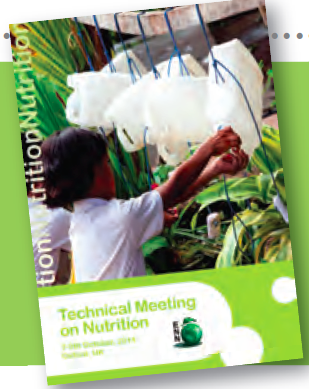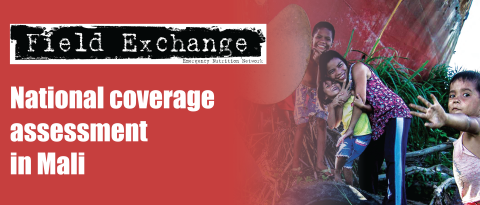Report on ENN Technical Meeting on Nutrition
 The ENN convened the first ‘Technical Meeting on Nutrition’ (TMN) in Oxford from October 7th to 9th 2014. The meeting was funded by USAID/OFDA and Irish Aid, with UNHCR, ACF France, World Vision and Concern Worldwide also contributing funds. The meeting was attended by around 120 delegates comprising country representatives, United Nations (UN) agencies, non-governmental organisations (NGOs), donors, academics and independents largely from the nutrition sector; but also some representatives from other sectors including water, sanitation and hygiene (WASH), health and social protection.
The ENN convened the first ‘Technical Meeting on Nutrition’ (TMN) in Oxford from October 7th to 9th 2014. The meeting was funded by USAID/OFDA and Irish Aid, with UNHCR, ACF France, World Vision and Concern Worldwide also contributing funds. The meeting was attended by around 120 delegates comprising country representatives, United Nations (UN) agencies, non-governmental organisations (NGOs), donors, academics and independents largely from the nutrition sector; but also some representatives from other sectors including water, sanitation and hygiene (WASH), health and social protection.
The TMN was convened at the request of numerous actors in nutrition and other related sectors and aimed to:
- Provide a forum to address specific technical, programming and policy issues relevant to nutrition in emergencies and high burden contexts
- Share and appraise key research
- Discuss ongoing policy and programme challenges, and
- Provide ‘space’ for informal technical exchange.
To guide the process, an interagency steering group1 was established that oversaw the agenda, participant invites, and helped select the abstracts for presentation. An informal Advisory Group was also established to develop the nutrition sensitive and international architecture/governance elements of the meeting.
 The TMN agenda was carefully constructed to ensure the many aspects of nutrition policy, research and programming highlighted in the large number of submitted abstracts could be presented. A total of 41 presentations were delivered in various formats (plenary, market place and parallel sessions; see www.ennonline.net/aboutTMN2014hub for all abstracts and presentations). Time was also given for extensive question and answer sessions after each set of presentations.
The TMN agenda was carefully constructed to ensure the many aspects of nutrition policy, research and programming highlighted in the large number of submitted abstracts could be presented. A total of 41 presentations were delivered in various formats (plenary, market place and parallel sessions; see www.ennonline.net/aboutTMN2014hub for all abstracts and presentations). Time was also given for extensive question and answer sessions after each set of presentations.
The first morning provided a global overview of the current nutrition architecture, including the Scaling Up Nutrition (SUN) movement2. This was followed by a session on the links between WASH and nutrition. The second day started with discussions surrounding social protection and nutrition, with a particular focus on cash transfers in emergency situations. This was followed by a presentation by the ENN on the nutrition sector response to the Syria region emergency as captured in a special edition of Field Exchange (issue 48). Following a lively market place session and a structured debate, presentations on the linkages between wasting and stunting were given. The third morning began with three presentations from country delegates, grounding us in the reality of policy and programming at national level. Three parallel sessions on severe acute malnutrition (SAM) followed, allowing time for detailed examination and discussion of important technical issues. The last afternoon was used for group work on three different areas, which participants had identified as warranting more discussion.
A number of themes and learning emerged over the three days and key amongst these were that:
- No country is free from malnutrition; all countries face burdens of under-nutrition or overweight and these often co-exist.
- Nutrition-sensitive spending has intensified, but needs to increase much more if we are to make effective inroads in achieving nutrition outcomes from multi-sectoral programming. Nutrition sensitive work also requires a more solid evidence-base (both for WASH and cash), as well as a greater understanding of the ‘how’ to implement programming to maximise effectiveness. In the meantime, we need to take something of ‘a leap of faith’ and use pragmatic judgement when cast iron evidence is unavailable, to ensure that the current momentum for nutrition is capitalised upon.
- Common and consistent messaging would considerably help in our discussions with other sectors.
- Nutrition specific work requires a more ‘holistic’ approach, with less ‘siloing’ in the areas of policy, programming and financing for the various forms of undernutrition (e.g. stunting and wasting).
- There is a potential new window of opportunity in adolescence for linear catch-up growth and more evidence gathering will be important to establish what, how and where efforts should best be targeted, to capitalise upon this opportunity.
- We need more constructive engagement with the private sector.
Three fundamental ‘needs’ to effect better nutrition outcomes were repeatedly raised during the meeting; strengthened Leadership, Coordination and Accountability.
The ENN hopes that this meeting proves to be the first step in establishing a regular forum where technical, research, programming and policy issues related to nutrition can be discussed. In order to inform any future meeting, TMN participants were invited to complete an evaluation questionnaire. Of the 60 participants who completed these, 16% rated the meeting as excellent, 37% rated the meeting as very good and 32% rated the meeting as good (total of 85% rating as good, very good or excellent). The quality of presentations was also considered good, very good or excellent; 83% for plenary, 91% for market place and 93% for parallel sessions. Ninety per cent of respondents also valued the time given within the agenda for networking.
Respondents also appreciated the efforts to include issues surrounding multi-sectoral programming, and found the country-level presentations particularly interesting. The recurring theme of the need to communicate and coordinate better, both within the nutrition sector and more widely was highlighted, with 86% of respondents considering that a there is a need for a future TMN, with varied ideas about where it should be held and who should host (around three quarters of respondents suggested that the ENN should host it again, with some suggesting co-hosts with various UN or international agencies). Comments for how to improve future meetings included having a broader representation of sectors, development actors and government representatives; providing more opportunities for participation and discussion during the sessions; and more focus on technical issues along with issues of institutional architecture and financing.
For more information see the full meeting report at http://files.ennonline.net/attachments/2306/TMN-Report-WEB.pdf
1 The steering group comprised Concern Worldwide, ACF-F, UNICEF, UNHCR, GNC, OFDA, UCL, Canadian Foodgrains Bank, Sun Movement Secretariat (SMS)


